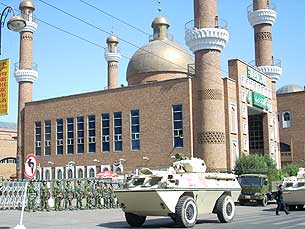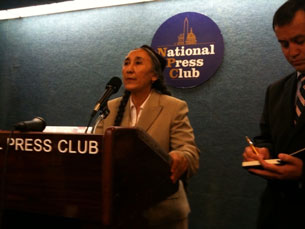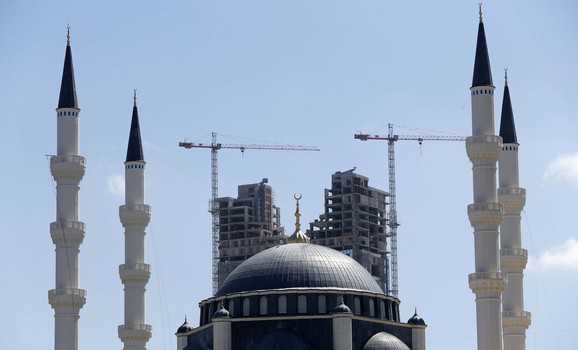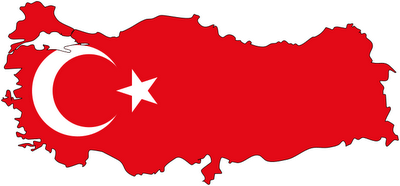2009-07-10
A man contacted by RFA in Urumqi tells about his fears while the official Chinese media strive to portray a city under control and life back to normal.

Chinese People’s Armed Police in front of the Grand Bazaar in Urumqi, on July 9.
“Major streets in Urumqi seemed peaceful Friday,” said the official Xinhua news agency.
“Life back to normal in Urumqi,” said a caption over a Xinhua picture showing residents buying vegetables in a market.
But Uyghurs, who say their grievances are routinely ignored and suppressed as “separatism” by Beijing, describe the atmosphere as anything but normal.
One man in Urumqi, reached by telephone by RFA, said that for its Uyghur minority, Urumqi was “an open prison.”
Xinhua did acknowledge that “security remained tight” and that “some mosques were shut on Friday “for security reasons.”
By RFA’s count, only two mosques were open in Urumqi, the capital of the Xinjiang Uyghur Autonomous Region (XUAR) with a population of 2.3 million people.
White mosque opened
On Friday, Uyghur men demanded that they be admitted to the White Mosque near the neighborhood where some of the worst violence occurred following Uyghur protests, a police crackdown, and ethnic clashes that left at least 184 dead, according to an official Xinhua report.

The police decided to open the mosque, apparently in order to avoid yet another clash.
According to the Associated Press, a group of 10 policemen blocked a small demonstration not far from the White Mosque.
About 40 Uyghur men and women “began to march, shouting, crying and pumping their fists in the air as they walked.”
“The Uyghur people are afraid,” said Madina Ahtam, a woman in a multicolored headscarf, who spoke English. “Do you understand? We are afraid. … The problem? Police.”
Police “pushed journalists away from the area and detained at least four foreign journalists, holding them for several hours.”
Death toll
China on Saturday issued its latest casualty figures – 137 ethnic Han Chinese and 46 Uyghurs. A man of Hui nationality was also reported to have been killed.
Many Uyghurs believe that this understates the Uyghur death toll.
In an interview on Friday with AP Television, Rebiya Kadeer, the exiled Uyghur leader, said that China’s casualty toll for the unrest has greatly understated the number of Uyghur killed.
The man contacted by RFA said that Uyghurs were currently unable to move freely around the city.
The man’s name is not disclosed in order to protect him from retaliation.
“We cannot go out freely,” he said. “Whenever they see some Uyghur people gathering up, they are forcing them to go inside.”
“Fully armed police are marching around in the street, in front of our doors. Just below my house, there are police officers, and they can break in and take me away at any time.”
This man seemed to express a kind desperation displayed by many in the city.
“The heart of the Uyghur people in our land is broken,” he said. “We can only ask God for help. No one is here to protect us.”
Foreign reactions
Overseas, The Organization of the Islamic (OIC) condemned the “disproportionate” use of force in Xinjiang, according to Agence France-Presse.
The OIC called on China to carry out an “honest” investigation into the clashes and find those responsible for the killings.
Turkey’s Prime Minister Recep Tayyip Erdogan told reporters that the issue should be taken to the United Nations’ Security Council.
The head of Indonesia’s largest Muslim political party, the Prosperous Justice Party, called for the U.N. and Western countries to put pressure on China to stop the “slaughter” of Uyghurs and Han Chinese.
Original reporting in Uyghur by Erkin. Uyghur service director: Dolkun Kamber. Written for the Web by Dan Southerland.
https://www.rfa.org/english/news/uyghur/eyewitness-07102009094007.html






